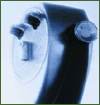[...] a light, flexible solar panel that is a little thicker than photographic film and can easily be applied to everyday fabrics. The thin, bendy solar panels, which could be on the market within three years, are the fruit of a three-nation European Union research project called H-Alpha Solar (H-AS).
(from an article in New Scientist)
In the article they're talking about using these in large patches to recharge cell phones and iPods while you're walking around. I think they'll actually be much more useful as ways to create small computational objects that live outside and are always on. Depending on durability, cost, power, and recyclability imagine integrating these into, say, stuff that's destined to lie by the side of the road. McDonald's cups with a solar patch, a small amount of hardware and a tiny transmitter could create an ad hoc trash network from coast to coast.
Or something.
On that note, I wonder if there's a battery that can be made of leachate. That way, maybe technology could have a built-in leachate mode that used the power of the garbage dump to power little computational devices--each dump could form its own computer, making money off of the trash.



